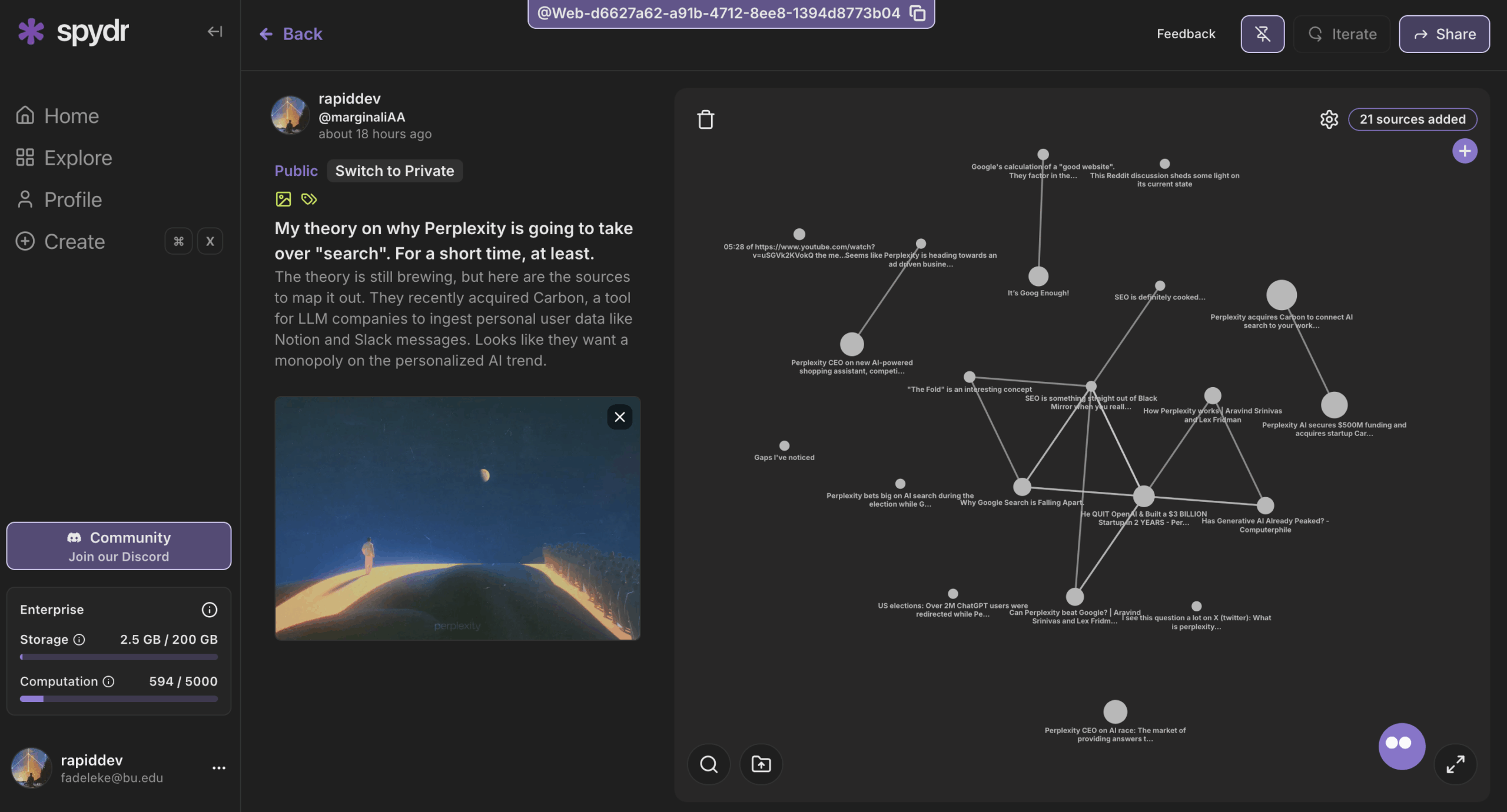Table of Contents
Overview
In today’s digital landscape, we’re constantly juggling information across countless applications. The internet, in its current form, wasn’t built for the AI-first world we’re rapidly entering. Information is fragmented, and your crucial context remains trapped within isolated apps, unable to follow you. Enter Spydr Memory MCP, launched on Product Hunt in June 2025, a solution designed to bridge this gap by leveraging the Model Context Protocol (MCP) standard introduced by Anthropic in November 2024. While not the first MCP implementation, Spydr offers a user-friendly, project-based approach to multimodal context management for AI clients.
Key Features
Spydr Memory MCP builds upon the established MCP standard to provide these verified capabilities:
- Multimodal Context Storage: Integrates diverse data types such as web content, YouTube videos, and files into a unified context management system
- MCP-Standard Architecture: Works with any AI client that supports the Model Context Protocol, ensuring broad compatibility with the growing MCP ecosystem
- Project-Based Context Management: Organizes information like coding projects, allowing users to build and manage their contexts systematically
- API Integration: Provides seamless integration with existing AI clients through standard MCP APIs
- Social Discovery Features: Enables sharing and collaboration on contexts with others, allowing users to discover and build upon structured knowledge
How It Works
Spydr Memory MCP operates as an MCP server that implements the standardized Model Context Protocol established by Anthropic. It collects and maintains context data from various sources you interact with daily, including websites, videos, and files. This information is structured and stored in project-like formats, making it accessible to any MCP-compatible AI system through standardized APIs. The system processes everything according to MCP specifications, ensuring interoperability with the broader ecosystem of MCP clients and servers.
Use Cases
Spydr Memory MCP enables various applications within the MCP ecosystem:
- Universal AI Memory: Transform any AI agent into one that knows everything about you by providing consistent context across different platforms
- Project-Based Knowledge Management: Organize information like software projects, making complex knowledge structures easily accessible to AI systems
- Cross-Platform Context Sharing: Enable seamless information transfer between different MCP-compatible AI tools and applications
- Collaborative Knowledge Building: Share and discover structured contexts created by other users, fostering community-driven knowledge development
- Research and Documentation: Maintain comprehensive context repositories for ongoing research projects or documentation efforts
Pros \& Cons
Advantages
- Standard Compliance: Built on the open Model Context Protocol standard, ensuring compatibility with the growing MCP ecosystem
- User-Friendly Interface: Provides an accessible way to manage complex context data without technical expertise
- Free Tier Available: Offers free options for users to get started with context management capabilities
- Social Features: Includes collaborative elements for discovering and sharing structured knowledge with others
- Future-Proof Design: Benefits from ongoing MCP standard development and community contributions
Disadvantages
- Security Risks: Inherits known MCP security vulnerabilities including command injection, token theft, and prompt injection attacks
- Privacy Concerns: Centralized context storage raises questions about data handling and user privacy, common to MCP implementations
- Limited Track Record: As a service launched in June 2025, long-term reliability and support remain unproven
- MCP Dependency: Subject to limitations and evolution of the underlying Model Context Protocol standard
- Learning Curve: Requires understanding of project-based context organization for optimal effectiveness
How Does It Compare?
Spydr Memory MCP operates within the established MCP ecosystem rather than pioneering entirely new technology. Competitors include Supermemory MCP, which offers universal memory for all LLMs, and various other MCP server implementations available through the official Model Context Protocol organization. Spydr differentiates itself through its user-friendly, project-based approach and social features for context discovery and sharing. The broader MCP ecosystem includes implementations from major companies like OpenAI and Google DeepMind, who have announced support for the protocol.
Final Thoughts
Spydr Memory MCP represents an accessible implementation of the Model Context Protocol standard, offering a user-friendly approach to AI context management. While built on the solid foundation of Anthropic’s MCP specification, users should be aware of inherent security risks associated with MCP implementations, including potential command injection and data privacy concerns. The service’s success will depend on how well it addresses these challenges while maintaining the benefits of standardized, interoperable AI context management. As part of the growing MCP ecosystem, Spydr offers a promising entry point for users seeking to enhance their AI interactions through persistent, structured context management.
